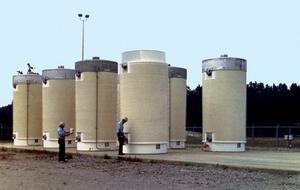Nuclear wasteNRC will not require nuclear plants to transfer waste to dry cask storage
Cooling pools on the grounds of U.S. nuclear plants, where toxic nuclear waste is stored, are near capacity, and in 2010 the plug was pulled on the Yucca Mountain centralized national nuclear waste repository, meaning that for the foreseeable future radioactive will continue to accumulate on site at the more than 100 nuclear power plants. Lawmakers called on the U.S. Nuclear Regulatory Commission (NRC) to require nuclear plants to hurry the transfer of spent fuel from the cooling pools to dry cask storage, which scientists consider much safer. The NRC, however, has decided that, at least for now, there is now reason to require nuclear plants to do so.

Dry storage casks for nuclear waste // Source: nps.gov
The U.S. Nuclear Regulatory Commission (NRC), acting on recommendations from its staff, has rejected requests from some U.S. senators and watchdog groups to require nuclear plants to hurry the transfer of spent fuel from the pools where most of the waste is stored to dry cask storage. Many plants have already begun transferring the waste because spent fuel pools are near capacity, and the Energy Department has yet to build a centralized national nuclear waste disposal site.
An NRC memo issued last Friday said the commission refuses further to deal with the issue. “The Commission has approved the staff’s recommendation that this … activity be closed and that no further generic assessments be pursued related to possible regulatory actions to require the expedited transfer of spent fuel to dry cask storage,” read the memo from Rochelle Bavol, acting secretary of the commission to Mark Satorius, the commission’s executive director for operations.
Bill Dean, the NRC’s Northeast Regional administrator, said that the agency had concluded that both spent fuel pools and dry casks were “adequate storage processes for spent fuel, and there is not a significant safety benefit to requiring full transfer to dry cask storage.”
The Star Tribune reports that Senators Patrick Leahy (D-Vermont), Bernie Sanders (I-Vermont), Barbara Boxer (D-California), Edward Markey (D-Massachusetts), and Kirsten Gillibrand (D-New York) wrote to NRC chief Allison Macfarlane earlier in May to complain about lax security measures at closed nuclear plants. Leahy and Sanders have also noted security concerns about the storage of nuclear waste at the Vermont Yankee Nuclear Power Plant. The Senators highlighted the risks posed by spent fuel pools, where highly radioactive nuclear fuel rods are stored. “We are one natural disaster, mechanical failure or terrorist attack away from a disaster,” Sanders said in a statement last Tuesday. “The sooner we get the spent (fuel) out of the pools and into dry casks, the better, and if the NRC will not change the rules, I will continue to work with my colleagues to change the rules through legislation.”
The senators cited studies claiming that “draining a spent nuclear fuel pool can lead to fires, large radioactive releases and widespread contamination” and that research has found spent fuel pools “could not be dismissed as potential targets for terrorist attacks.”
Boxer, chair of the Senate Environment and Public Works Committee, said she was “deeply troubled” by the NRC’s decision. “Earlier this month, a wildfire came within a half mile of the now-closed San Onofre nuclear plant, which is storing most of its spent fuel in pools rather than in dry cask storage,” Boxer said.
David Lochbaum, director of the nuclear safety project at the Union of Concerned Scientists disagrees with the NRC’s decision. “We’re very disappointed by that decision, because it’s wrong,” he said. Calling it “very shoddy work. It was incomplete, inaccurate.”
